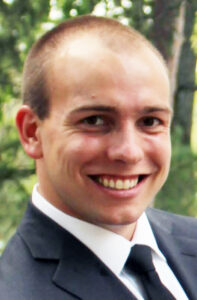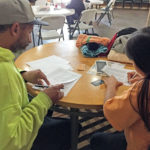By Patrick Schmadeke
Our present polarity makes it seem like there is no reasonable middle ground. However, most of the time there is. And yet, emphasis on reasonableness in public discourse goes in and out of fashion. This is inevitable when expediency is a guiding principle. We must seek a middle ground, perhaps in compromise, or perhaps in some hitherto unforeseen possibility.

Lately, it seems that the minds of many popular voices in contemporary political and religious discourse are set on producing division, alienating those who disagree and attempting to incite defensiveness and agitation. We must be neither predisposed to find fervent speech inherently appealing, nor swayed by biased positions concealed in cleverly cadenced rhetoric. Rather, we must be “shrewd as serpents and pure as doves” (Matthew 10:16). In short, cooler heads with proper intentions must prevail.
Heated political disagreement is on the rise — not a surprising reality as we approach the November elections. With both the Republican and Democratic conventions now completed, we are into the homestretch of this political season. It seems wise on our part to respond by mitigating divisiveness and creating coalitions that work toward the common good. Innovative responses are called for as we attempt to squarely face the unique challenges of our historical-political moment — and these challenges are many. Much ails our society today. The efforts towards healing must be just as numerous.
Our response might be to listen to one another as bottled up political animus is aired. Political feelings run deep for us Americans. Prudence is called for in our listening. It seems unlikely that either political party has an eternal monopoly on virtue, so we would do well to learn from one another, enhancing everyone’s political ideas and efforts. Consistent group conversations about select topics would be a good step in the healing process our society needs.
Turning to the religious, another controversial topic on the rise has been the recent and surprising idea, at least to my mind, among some Catholics to reject the Second Vatican Council. This is surprising for many reasons. The documents of Vatican II, and the history around the Council, were regular topics of study in my graduate school experience. I simply cannot imagine Catholicism today without Vatican II. Similarly, the seminarians whom I studied alongside were equally formed by Vatican II. I cannot imagine what pastoring would look like for them without the Council. Vatican II is simply embedded in the DNA of Catholicism.
Of course, this is not to say that Vatican II cannot be critiqued. It most certainly can be critiqued with charity, thoughtfulness and discretion. For example, Pope Benedict XVI offered criticism of specific aspects of Vatican II. However, a specific critique is very different from a broad and wholesale rejection.
A response might be to listen to the grievances of those who find the rejection of Vatican II appealing. If complaints center on concrete implementations of Vatican II that went awry, rather than Vatican II itself, these implementations merit exploration. If the issue is with Vatican II itself, a response might be to dive into the history and documents of Vatican II collaboratively to dialogue about the Council. These nuanced texts would surely provide much fodder for reflective and ongoing discussion.
In these times of polarity, we must resist the temptation to succumb to simple binaries — simple yes or no to a party platform, simple yes or no to aspects of Vatican II.
There is something much more compelling to thoughtfulness. There is something much more compelling in the experience of mediating through disagreement and recognizing the complexity of the situations we face. May we be as shrewd as serpents and pure as doves, and aim to help each other along the way.
(Editor’s note: Patrick Schmadeke is a graduate of St. Ambrose University (‘13) and a graduate of the Master of Divinity program at the University of Notre Dame.)











